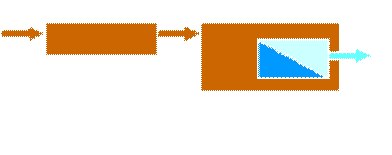| Products >Waste Water Treatment(for ETP & STP)>Tertiary Treatment >> |
|
| Membrane Based Filtration):- |
 |
|
| |
The process offers the following advantages: |
| Membrane Plant (MBR) |
 |
|
- Without expensive modifications, the wastewater of an existing plant is disinfected and virtually free from germs. Therefore a discharge into bathing water areas, or use for irrigation in agriculture is possible.
- A substantially improved effluent quality is achieved. As particulate biomass flocks are rejected and an effluent virtually free from solids is achieved, a major reduction of the parameters COD, N, and P is effected.
- Extremely low P-values can be achieved with post-COD precipitation (between secondary clarification and TT).
- Due to the existing conventional mixed liquor separation a subsequent membrane filtration faces a considerably lower concentration of solids, therefore more cost-efficient membranes with a higher packing density can be used.
- If necessary, it is easily possible to filter just a partial flow.
- The effluent is also suitable for re-use, i.e. as washing water or for cooling tower applications. A further treatment of the MBR filtrate by Reverse Osmosis or activated carbon is increasingly cost-efficient for industrial applications. As the influent is free from solids, better reliability, increased recovery rates and substantially longer service life are achieved.
|
| |
|

